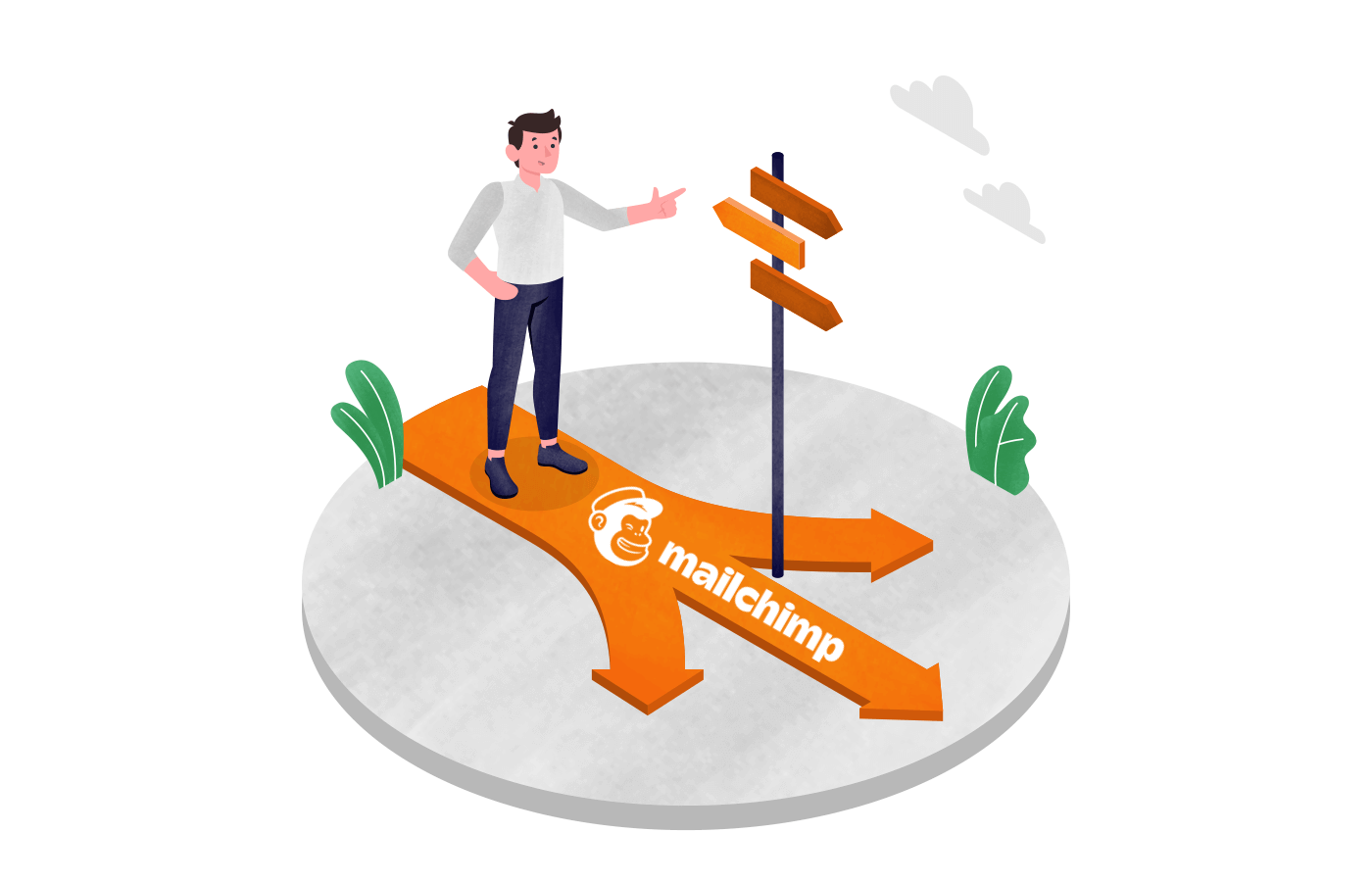Mailchimp might have been great for you at first. But its increasing costs and slow customer support have compelled you to search for other programs like Mailchimp in the market.
In this article, we’ll discuss various email marketing software alternatives for Mailchimp, including all rivals and competitors, to help you pick the best email service provider for your business.
So stay with us to learn how these alternatives to Mailchimp can save you hundreds of dollars every year or increase your business’s revenue!
Why Consider Alternatives to Mailchimp?
While Mailchimp remains a popular email marketing solution, many users complain about its pricing, slow customer support, and buggy interface. So, they look for other affordable email marketing solutions.
Here is why you should consider its email marketing competitors:
- High costs. Mailchimp is up to 6x costlier, when compared to other tools like Sender, which charges $15 monthly for the same number of contacts;
- Complex pricing model. Mailchimp’s pricing structure is confusing. Mention of overages (additional charges) on almost all plans makes everything cryptic;
- Limited free plan. Mailchimp only offers basic features (and restrictive limits) on free version as well as lower plans, severely limiting your marketing strategy;
- Deliverability issues. Only 75.99% of Mailchimp emails end up in the mailbox, which is alarmingly low compared to other players;
- Customer support. Mailchimp has horribly slow customer support. And since it’s English-only, it makes it hard to get the help in need.
User Reviews
The reasons above are not just opinions. People have been sharing their experience with Mailchimp across major review platforms, such as Trustpilot, G2, and Capterra. They share how overpriced and slow the platform is and how they’ve had a bad experience.
One such user shared his experience and pointed out the glitches on the platform.

If you look at independent reviews, you’ll find many complaints about billing issues, customer support, and Mailchimp costs. If you’re facing the same issues, read on to find the best Mailchimp alternatives and apps like Mailchimp for your email marketing operations.
Mailchimp Alternatives: Comparison Table
If you want an overview of all the alternative email marketing tools you can use, here’s a table to help you decide faster. Check out the limits, pricing, as well as best features, and make a pick.
| Cost | Monthly Emails | Subscriber Limit | Free Plan | Best Feature | |
| Sender | Starts at $15 | 30,000 | 2,500 | Yes | Visual automation builder |
| HubSpot | Starts at $18 | 5,000 | 1,000 | Yes | Free CRM & funnel builder |
| Klaviyo | Starts at $35 | 5,000 | 500 | Yes | A/B testing |
| Omnisend | Starts at $16 | 6,000 | 500 | Yes | Unlimited segmentation |
| Brevo | Starts at $9 | 5,000 | 500 | Yes | Whatsapp/SMS marketing features |
| Moosend | Starts at $9 | Unlimited | 500 | No | Automation workflows |
| Drip | Starts at $39 | Unlimited | 2,500 | No | Customer journey builder |
| GetResponse | Starts at $16 | Unlimited | 1,000 | Yes | Conversion funnel builder & CRM |
| Omnisend | Starts at $16 | 6,000 | 500 | Yes | Review management |
| Sendgrid | Starts at $15 | 15,000 | 5,000 | Yes | Transactional API |
| Mailjet | Starts at $17 | 15,000 | Unlimited | Yes | Template library |
| Constant Contact | Starts at $12 | 5,000 | 500 | No | CRM dashboard |
| FloDesk | Starts at $38 | NA | NA | No | Brand guideline integration |
| Newsletter Plugin | Starts at $69 | 12,000 | 1000 | Yes | WordPress dashboard |
| Convert Kit | Starts at $9 | Unlimited | 300 | Yes | Lead magnet automation |
| ActiveCampaign | Starts at $15 | 10,000 | 1000 | No | Lead scoring capabilities |
16 Best MailChimp Alternatives of July 2024 Update
If you’ve been searching for the best email marketing services and companies like Mailchimp, look no further. Here’s an exhaustive section for email marketing platforms comparison you can refer to:
- Sender
- HubSpot
- Klaviyo
- Omnisend
- Brevo (formerly Sendinblue)
- Moosend
- DRIP
- GetResponse
- Omnisend
- SendGrid
- Mailjet
- Constant Contact
- Flodesk
- Newsletter Plugin
- ConvertKit
- ActiveCampaign
Let’s look at each of these alternatives one by one.
1. Sender — Better for Email Marketing Campaigns
- Simple email builder;
- Automations even on free plan;
- Responsive customer support.

Ratings: Capterra: 4.6 | G2: 4.4 | Shopify: 4.3
Sender outshines Mailchimp with its intuitive interface, valuable features, and a generous free plan. It offers several powerful tools for omnichannel marketing, like the drag-and-drop interface for simple campaign creation.
Sender offers all premium features at lower costs making it better than Mailchimp for email campaigns. There’s an automation builder, behavioral popups as well as SMS marketing. You can also create dynamic campaigns using custom fields and segmentation.
Sender’s human customer support responds as fast as a lightning, and leaves Mailchimp standing in the corner. So, you can always stay on track, without wasting time waiting for a response.
Plus, its library of free customizable email templates helps you create stunning designs without sweating out, making it a great free Mailchimp alternative.
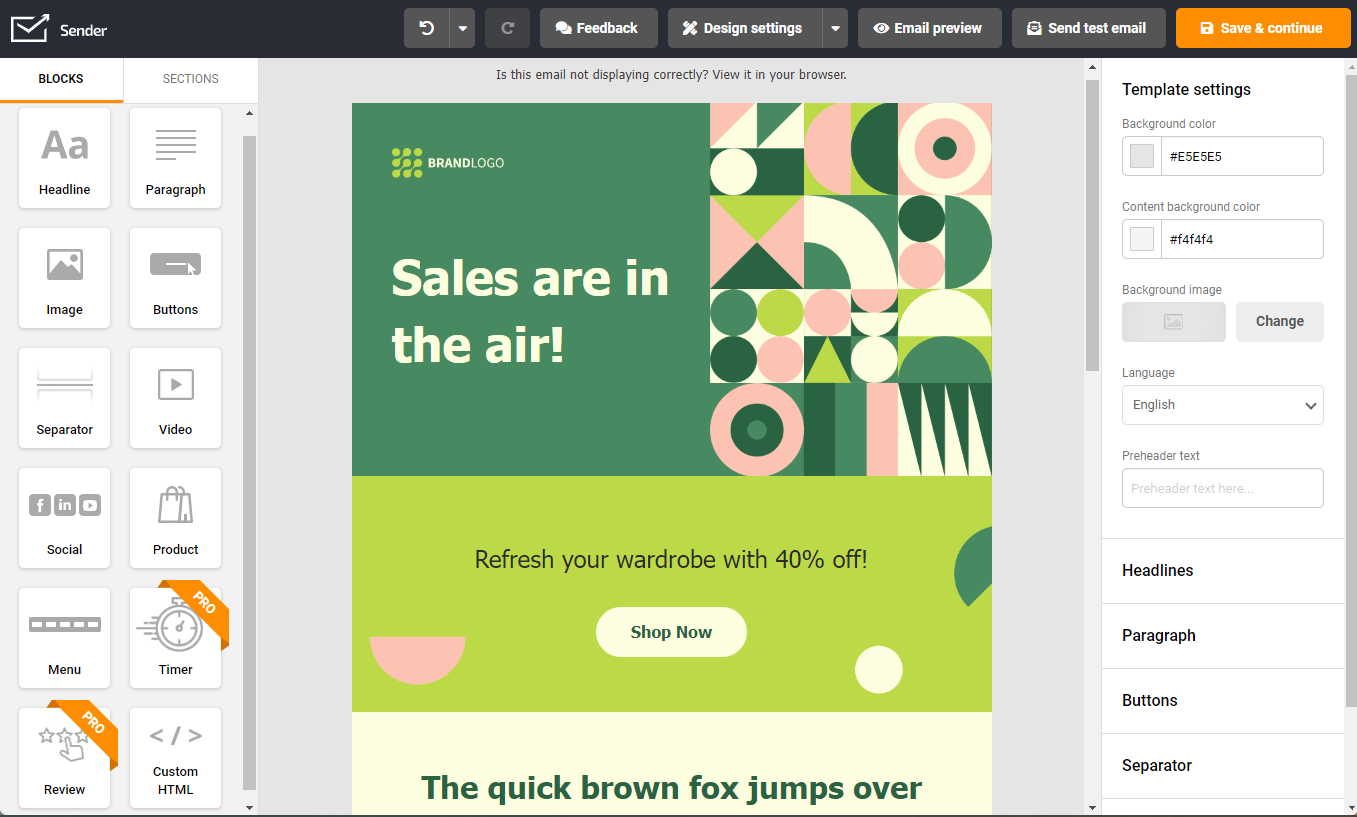
Sender Features
- Automated email campaigns;
- SMS marketing integration;
- Advanced segmentation and personalization;
- Detailed analytics and reporting;
- Intuitive drag-and-drop email builder.
Explore the complete list of features now
Pros & Cons
| Pros | Cons |
| User-friendly interface | No landing page builder (yet) |
| Cost-effective | |
| High deliverability rates |
Pricing & Free Plan
| Plan | Cost | Limitations |
| Free Plan | $0/month | Up to 2,500 contacts and up to 15,000 emails/month |
| Standard Plan | starts at $15/month | Up to 2,500 contacts and up to 30,000 emails/month |
| Professional Plan | starts at $29/month | Up to 2,500 contacts and up to 60,000 emails/month |
With Sender, send up to 15,000 emails per month to 2,500 contacts without any cost. This free plan includes access to an intuitive drag-and-drop email builder, automation workflows, and segmentation features, among other valuable tools, making it the best cheaper alternative to Mailchimp out there.
2. HubSpot — Top Mailchimp Competitors for Marketing Automation
- Ready-to-use design blocks;
- Free CRM;
- Massive integration ecosystem.

Ratings: Capterra: 4.5/5 | G2: 4.4/5 | Shopify: NA
HubSpot is a marketing automation platform that offers features similar to Mailchimp. You can leverage its in-built sales CRM system for managing a complex sales funnel. From a single dashboard, you can manage everything—from sales to operations, marketing to CMS.
HubSpot’s shared inbox feature includes tools for live chat, Facebook Messenger, chatbots, and team email. It also has a universal inbox that gives sales, marketing, and helpdesk teams one place to view, manage, and reply to all conversations.
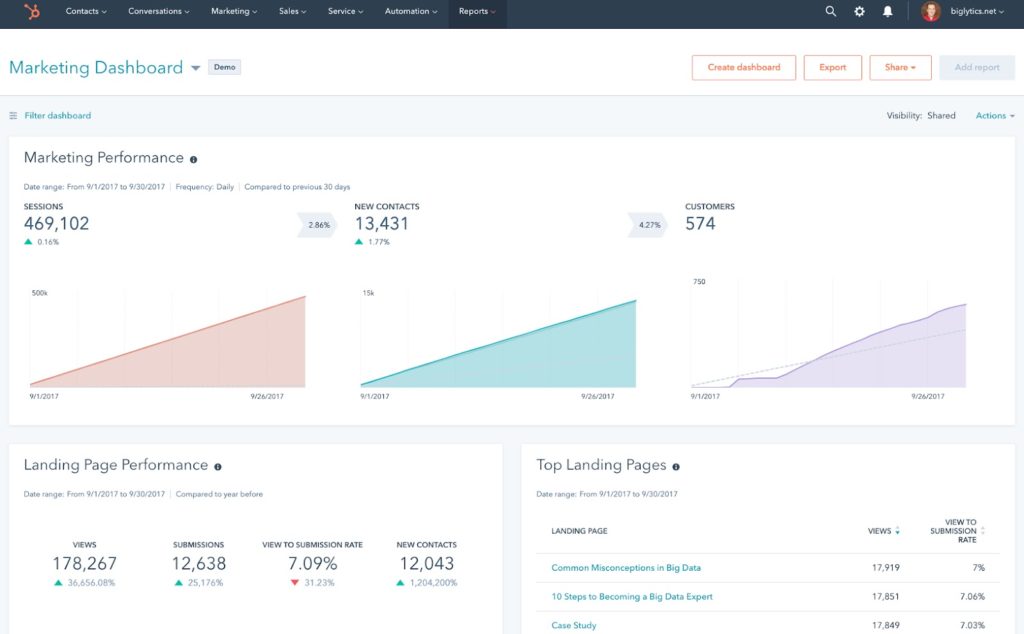
HubSpot Features
- In-built CRM system;
- Unified management of sales, operations, marketing, and CMS;
- Comprehensive email marketing automation;
- Shared inbox with tools for live chat, Facebook Messenger, chatbots, and team email;
- Instant integration with other marketing suites.
Pros & Cons
| Pros | Cons |
| Comprehensive all-in-one platform | Can be expensive, especially at higher tiers |
| Seamless integration with CRM | Steeper learning curve for beginners |
| Extensive and flexible reporting tools | Some features may be too complex for small businesses |
Pricing & Free Plan
| Plan | Cost | Limitations |
| Free | $0 per month | Up to 2,000 emails per month, limited email templates, includes HubSpot branding |
| Starter | $18 per month | Up to 1,000 subscribers and 5x tier contact limit for email sends |
| Professional | $800 per month | Up to 2,000 subscribers and 10x tier contact limit for email sends |
HubSpot’s free plan includes 2,000 email sends monthly with HubSpot branding and free tools for marketing, sales, service, CMS, operations, and commerce.
3. Klaviyo — Best Mailchimp Alternative for Ecommerce
- Customer profiles;
- Ecommerce automations;
- Advanced A/B testing.

Ratings: Capterra: 4.6/5 | G2: 4.6/5 | Shopify: 4.4/5
Klaviyo is for ecommerce store owners who want to build solid customer relationships. It’s useful for businesses looking to drive sales through omnichannel SMS & email marketing campaigns.
With this, you can build email-based customer experiences and connect with customers based on how they interact with your brand. Klaviyo also offers solutions to build landing pages and signup forms.
The platform’s simple design helps you spend less time learning and more time working on it.

Klaviyo Features
- Advanced segmentation;
- Automation workflows;
- Integration with popular ecommerce platforms;
- Detailed analytics and reporting;
- Forms and popup builder.
Pros & Cons
| Pros | Cons |
| Advanced segmentation options | Steeper learning curve |
| Strong integration with ecommerce platforms | Can be expensive for large email lists |
| Powerful automation capabilities | Can be complex to set up |
Pricing & Free Plan
| Plan | Cost | Limitations |
| Free plan | $0 per month | Up to 250 contacts and 500 emails per month; |
| $35 per month | Up to 500 contacts and 5,000 emails per month; | |
| Email + SMS | $60 per month | Up to 5,000 monthly emails + 1,250 SMS/MMS credits per month. |
Klaviyo’s free plan offers a starting point with a monthly email send limit of 500, 150 free monthly SMS/MMS credits (plus applicable carrier fees), and email support for the initial 60 days.
4. Omnisend — Best Alternative for Growing Audience
- Product recommendations
- SMS marketing
- Product reviews

Ratings: Capterra: 4.7 | G2: 4.6 | Shopify: 4.7
Omnisend is an excellent choice for online merchants looking for Mailchimp alternatives that can help them boost their sales and grow their audience.
Designed specifically for ecommerce, it offers powerful email and SMS marketing automation tools to help you engage with your customers and drive more revenue, including pr-built global SMS marketing workflows, automated product recommendations, product reviews, and more.
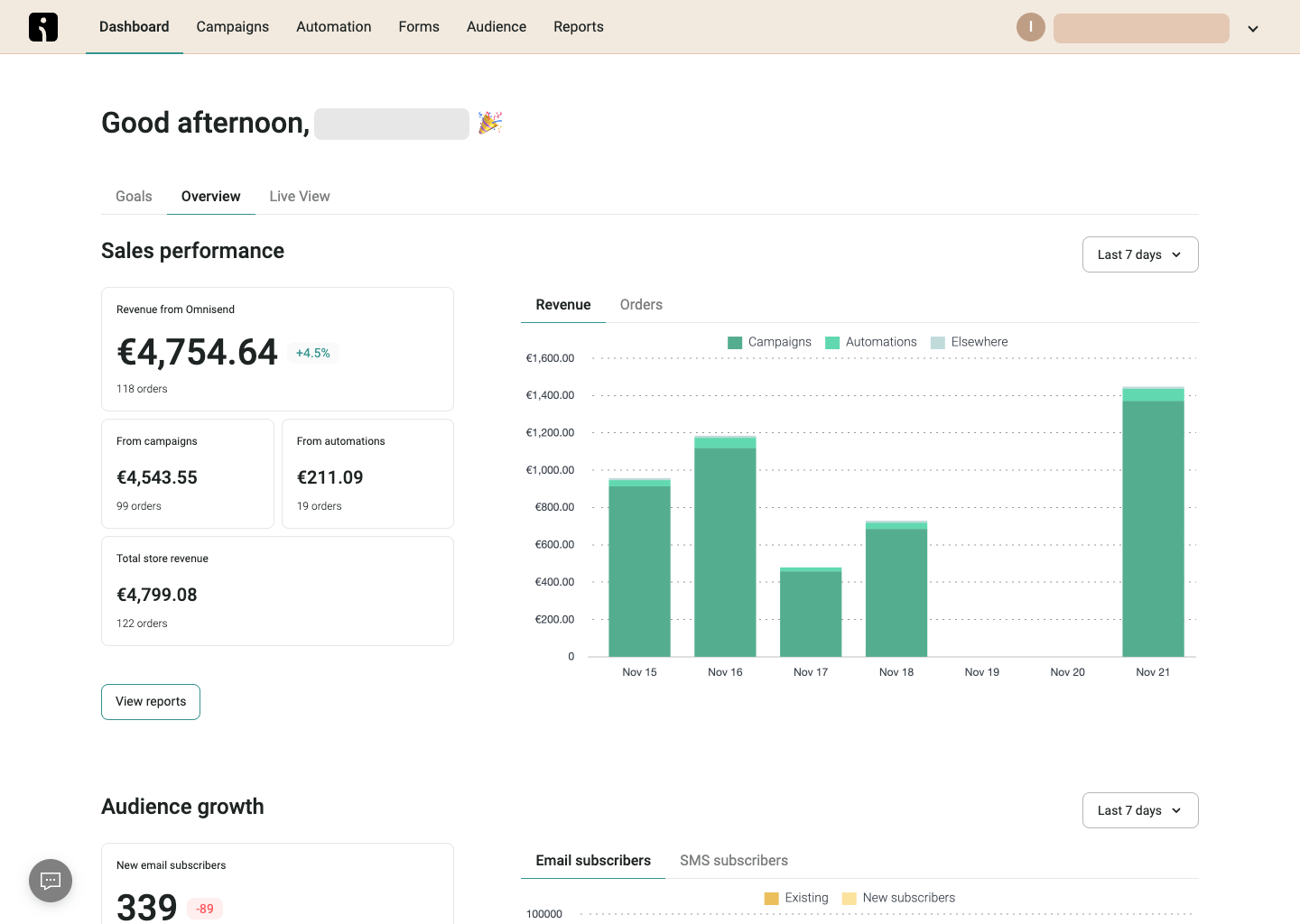
Omnisend Features
- 350+ pre-made email & signup form templates;
- Ecommerce automations;
- Detailed reporting;
- Email and SMS marketing;
- Web push notifications.
Pros & Cons
| Pros | Cons |
| Built for ecommerce | Only available in English |
| Award-winning 24/7 support | Must connect your online store |
| User-friendly interface |
Pricing & Free Plans
| Plan | Cost | Limitations |
| Free | $0 per month | Up to 250 contacts and 500 emails per month |
| Standard | $16 per month | Up to 500 contacts and 6,000 emails per month |
| Pro | $59 per month | Up to 2,500 contacts and unlimited emails per month |
Omnisend offers a free plan with access to all its premium features for up to 250 contacts and 500 monthly emails, 500 web push notifications, and 50 published product reviews.
5. Moosend — Best for Powerful Automation at an Affordable Price
- Email marketing automation;
- Customizable templates;
- A/B testing.
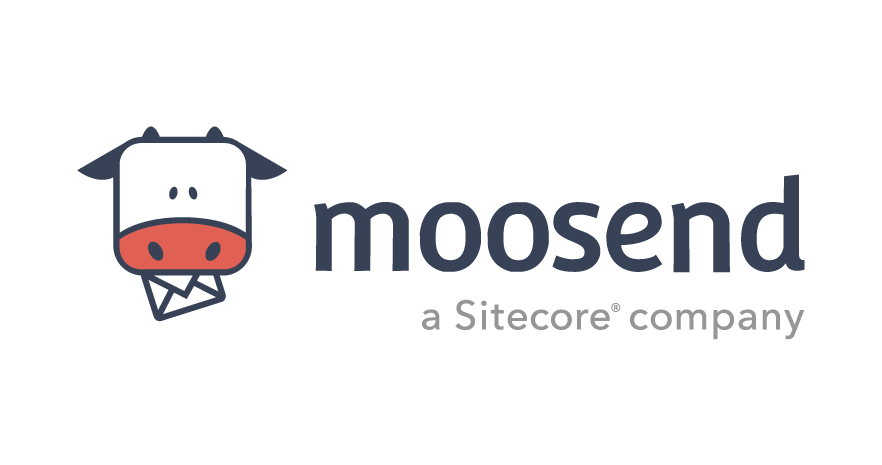
Ratings: Capterra: 4.6 | G2: 4.6 | Shopify: N/A
Moosend is among the best Mailchimp alternatives if you need advanced functionality and powerful automation options at an affordable price.
Unlike Mailchimp’s complex platform, Moosend has a straightforward interface and a minimal learning curve, allowing users to get the most out of the service quickly.
If you own an online store, Moosend’s ecommerce AI will help you deliver personalized product recommendations that can increase sales and drive more revenue. Finally, the platform offers unlimited email campaigns across all plans.
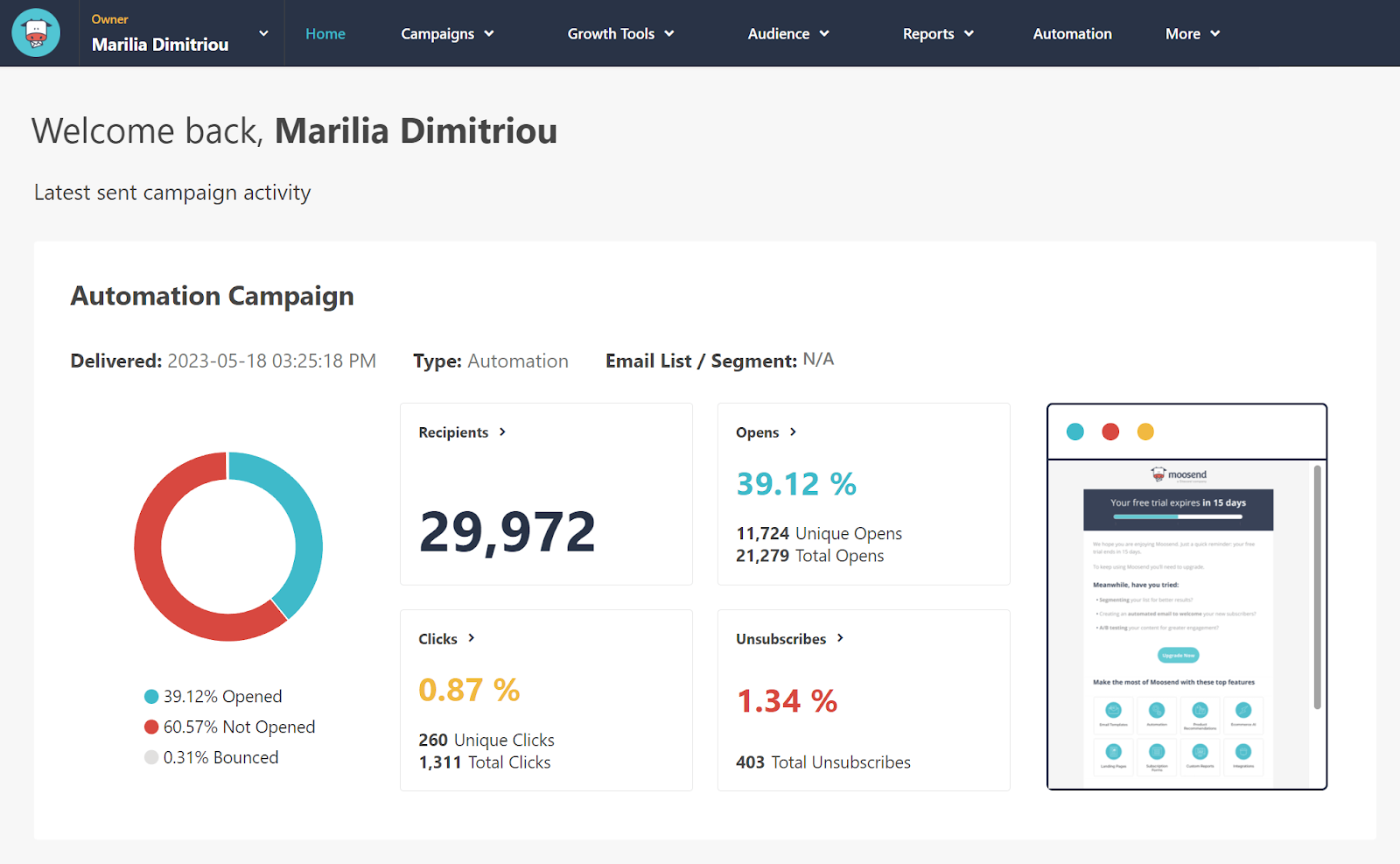
Moosend Features
- Intuitive drag-and-drop email editor;
- Powerful automation workflows (visual builder);
- Ecommerce AI;
- Audience Discovery tool;
- A/B testing;
- 24/7 customer support team.
Pros & Cons
| Pros | Cons |
| Powerful automation | Form builder lacks customization options |
| Advanced reporting and analytics (real-time) | No SMS marketing |
| Ecommerce AI |
Pricing & Free Plans
| Plan | Cost | Limitations |
| Moosend | $9 per month | Up to 500 contacts, unlimited monthly emails |
| Moosend + | Custom (depending on features selected) | |
| Enterprise | Custom |
Moosend has a 30-day free trial that lets you test all Pro features for 1,000 subscribers with unlimited emails.
6. Brevo (Sendinblue) — Best Alternative for Web Push Notifications
- Facebook Ads management;
- Landing page builder;
- Omnichannel automation.

Ratings: Capterra: 4.5 | G2: 4.5 | Shopify: 2.6
Brevo is for ecommerce store owners who need a unified marketing dashboard for emails, SMS marketing, web push notifications, and live chat.
You can manage all conversations across channels with a single contact (subscriber) from a single screen.
Plus, it has features to start and scale your marketing campaigns, like marketing automation and web push notifications. So, you can engage subscribers using email, SMS, and push notifications.
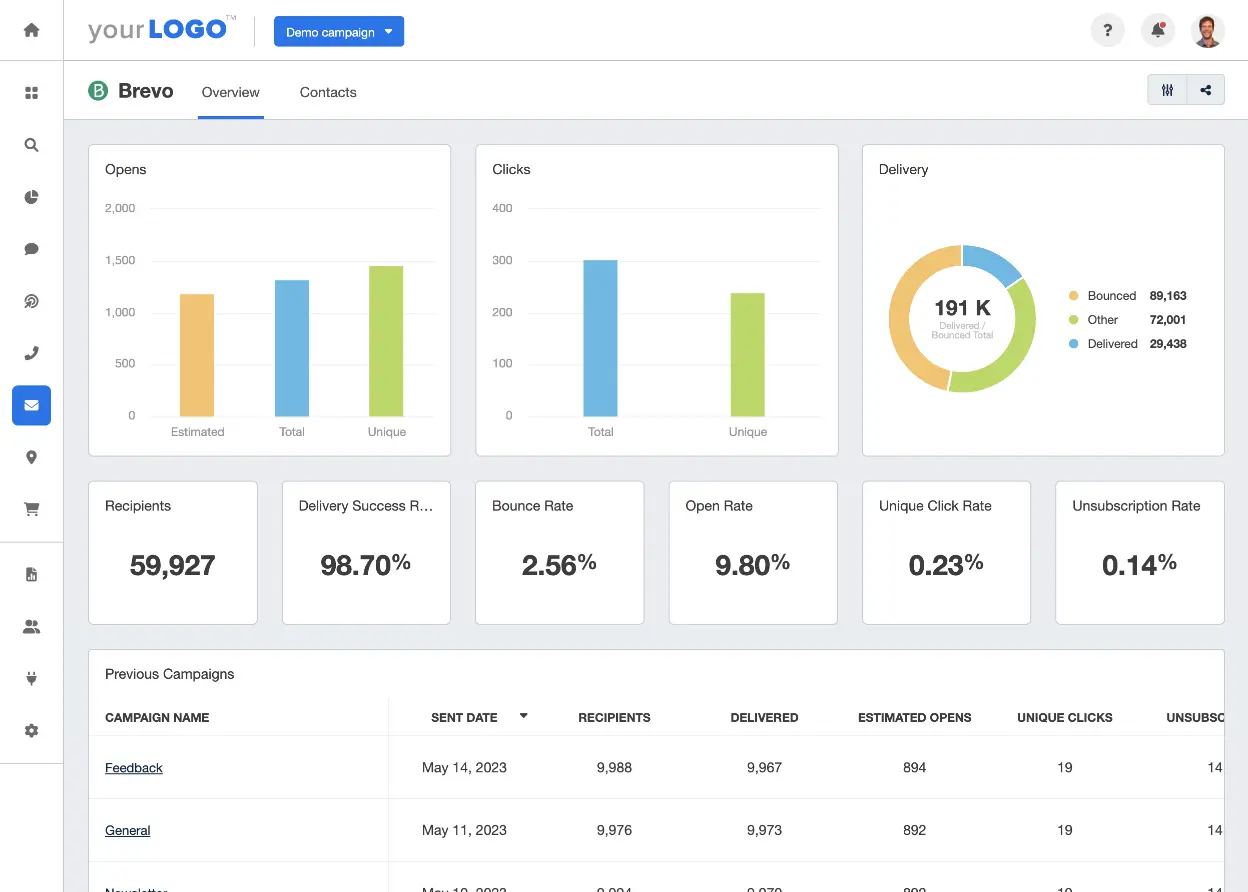
Brevo Features
- Email and SMS marketing;
- Advanced marketing automation;
- Transactional emails;
- Signup forms builder;
- Detailed reporting.
Pros & Cons
| Pros | Cons |
| Competitive pricing | Limited templates and design options |
| Easy-to-use platform | Slower customer support response times |
| Good automation and segmentation | Email sending speeds can be slow |
Pricing & Free Plans
| Plan | Cost | Limitations |
| Free | $0 per month | Unlimited contacts and up to 300 emails per day; |
| Starter | $25 per month | Unlimited contacts and up to 20,000 emails per month; |
| Business | $65 per month | Unlimited contacts and up to 20,000 emails per month + marketing automation features |
Brevo’s free plan includes unlimited contacts, the ability to send up to 300 emails daily, customizable email templates, a user-friendly drag-and-drop editor, and support for transactional emails, SMS, and WhatsApp campaigns.
7. DRIP — Affordable Email Marketing Automation Service
- Drip campaign automation;
- Customer journey tracker;
- Onsite experience builder.
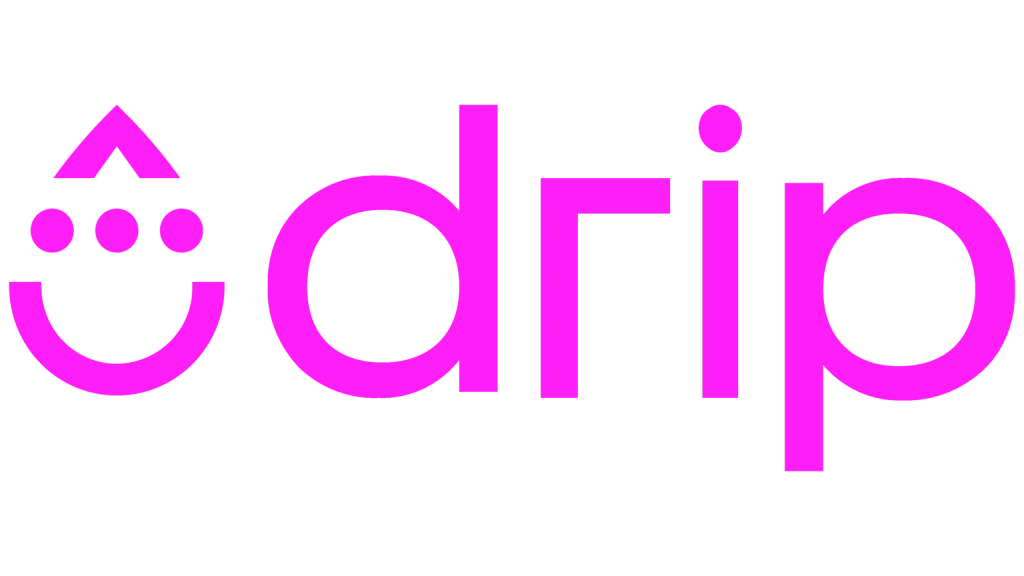
Ratings: Capterra: 4.4 | G2: 4.4 | Shopify: 4.6
Drip is an email program like Mailchimp with a user-friendly interface for omnichannel ecommerce marketing. You can streamline communication across email, website, and SMS.
Unlike MailChimp, Drip offers deeper customer segmentation and engagement capabilities. You can segment your list based on customer behavior and engagement and create personalized campaigns.
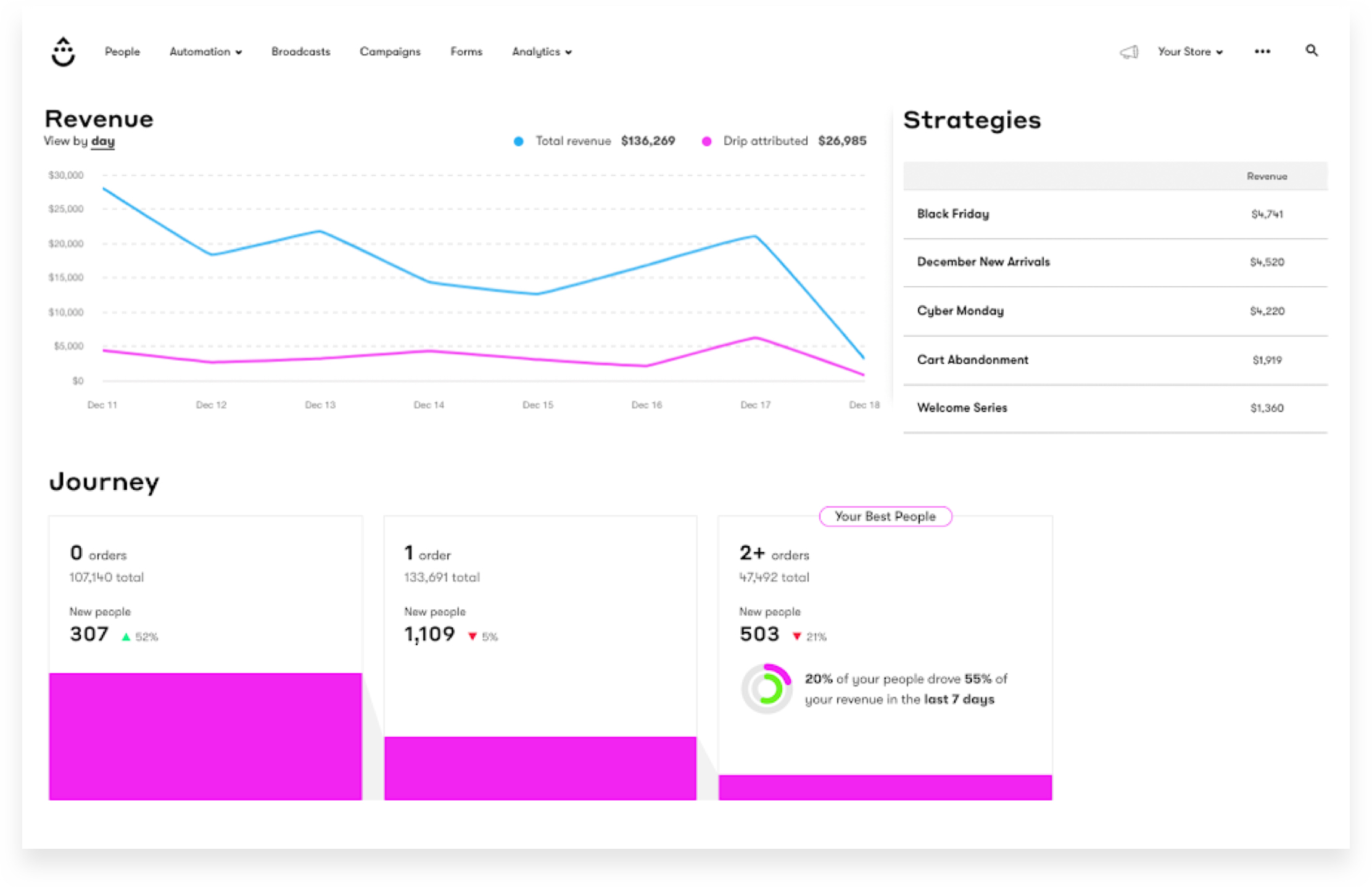
DRIP features
- Multichannel marketing;
- CRM for ecommerce;
- Workflow automation;
- Detailed analytics and reporting;
- Customizable forms and pop-ups.
Pros & Cons
| Pros | Cons |
| Advanced automation capabilities | Higher cost compared to some alternatives |
| Detailed segmentation and personalization | Steeper learning curve |
| Comprehensive analytics and reporting | Limited template design options |
Pricing & Free Plan
| Plan | Cost | Limitations |
| Basic | $39/month | Up to 2,500 subscribers, unlimited emails sends |
There’s no free plan, but there’s a 14-day free trial.
8. GetResponse — Similar to Mailchimp for Sales Funnels
- Conversion funnel builder;
- AI customer journey optimization;
- CRM capabilities.

Ratings: Capterra: 4.2 | G2: 4.2 | Shopify: 1.9
GetResponse is a great Mailchimp alternative designed to help you manage sales funnels. Its standout feature, “Autofunnel,” streamlines end-to-end marketing funnel creation.
Other noteworthy features include the ability to host webinars. GetResponse also stands out with multilingual support, a multimedia center featuring stock photos, and QR code generation, enhancing its versatility and usability.
It seamlessly integrates with popular ecommerce platforms such as WooCommerce and offers support for content management systems like WordPress.
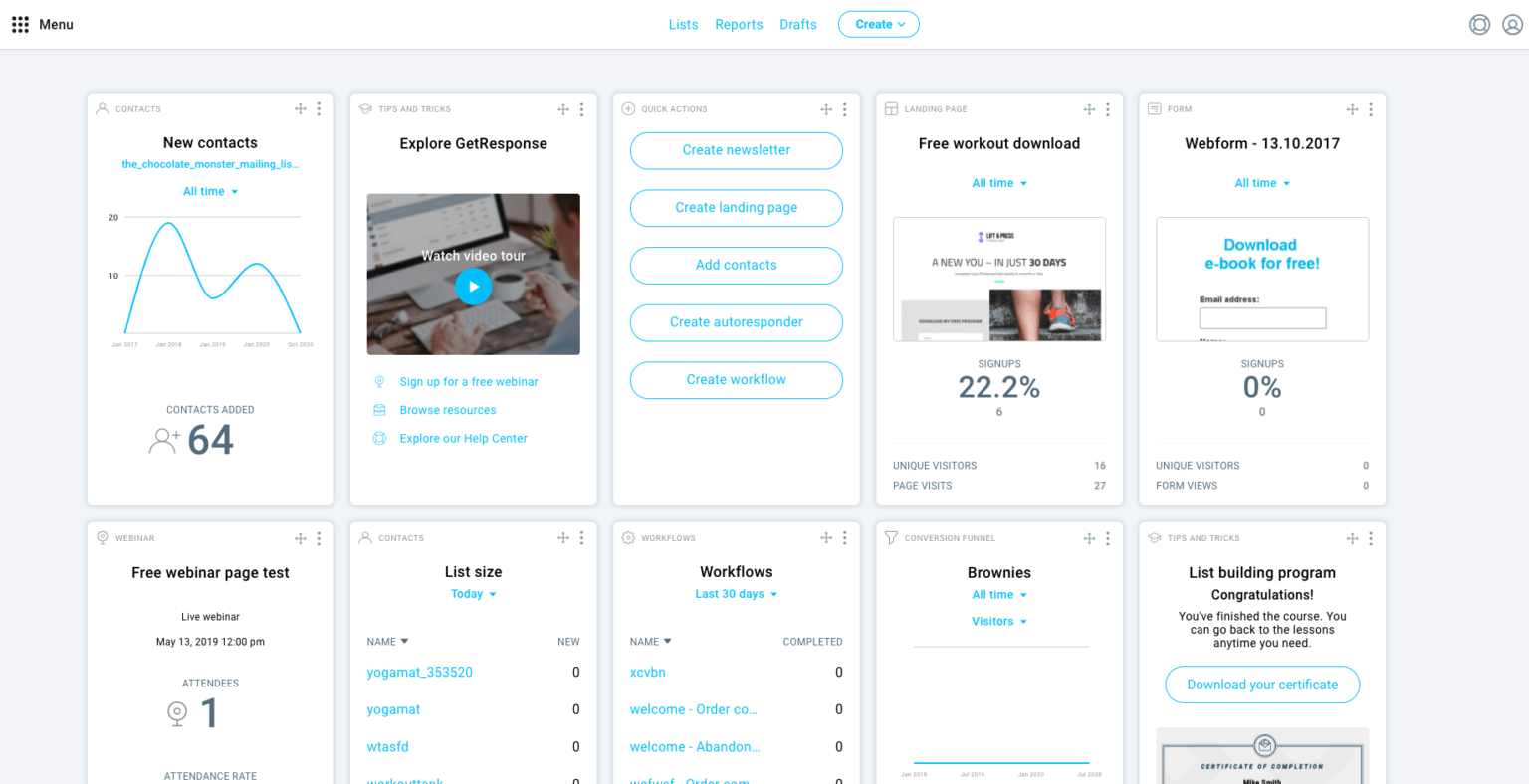
GetResponse Features
- A/B testing;
- Email analytics;
- Marketing automation workflows;
- Behavioral targeting;
- CMS integration.
Pros & Cons
| Pros | Cons |
| Wide range of features | Interface can be complex for beginners |
| Good automation and segmentation | Limited templates for landing pages |
| Competitive pricing | Some features lack depth compared to specialized tools |
Pricing & Free Plan
| Plan | Cost | Limitations |
| Email marketing | $16 per month | Up to 1,000 contacts, unlimited monthly email sends |
| Marketing automation | $54 per month | Up to 1,000 contacts, unlimited monthly email sends |
| Ecommerce marketing | $106 per month | Up to 1,000 contacts, unlimited monthly email sends |
GetResponse doesn’t have a free plan but offers a 30-day free trial.
9. Omnisend — App Similar to Mailchimp in Features
- Dynamic discount codes;
- On-site behavior monitoring;
- Product review automations.

Omnisend helps ecommerce businesses boost sales with useful features. It offers essential tools like popups, advanced segmentation and a drag-and-drop builder.
Omnisend stands out with its multi-channel flows. You can combine SMS, push notifications, and Facebook messages. Conditional logic and A/B testing further enhance campaign performance.
It also has exit-intent popups, and interactive forms features to capture leads. Plus, it features a lifecycle map for every subscriber to help identify customer nurturing needs.

Omnisend Features
- Ecommerce-friendly automation flows;
- Popups and forms;
- Audience sync for ads
- A/B testing
- SMS marketing & push notifications
Omnisend Pros & Cons
| Pros | Cons |
| Ecommerce automations | Confusing UI |
| Personalized product recommendations | Ambigious pricing model |
| 24×7 customer support | Buggy reporting |
Omnisend Pricing
| Plan | Cost | Limitations |
| Free plan | $0/month | 250 contacts, 500 emails/month, 500 push notifications |
| Premium plans | Starts at $16/month | 500 contacts, 6000 emails/month. |
10. SendGrid — Email Marketing Platform with SMTP Feature
- Spam testing;
- Email validation;
- Developer API.

Ratings: Capterra: 4.2 | G2: 4.0 | Shopify: NA
SendGrid is a free MailChimp alternative that ensures your emails land in your subscribers’ inboxes. It offers integrated email tests, spam testing, and email validation features to improve your email system delivery success rates.
It’s a scalable solution for developers planning email campaigns, thanks to API capabilities. It also offers a user-friendly drag-and-drop editor, email automation builders, and reporting dashboards for a comprehensive email marketing experience.
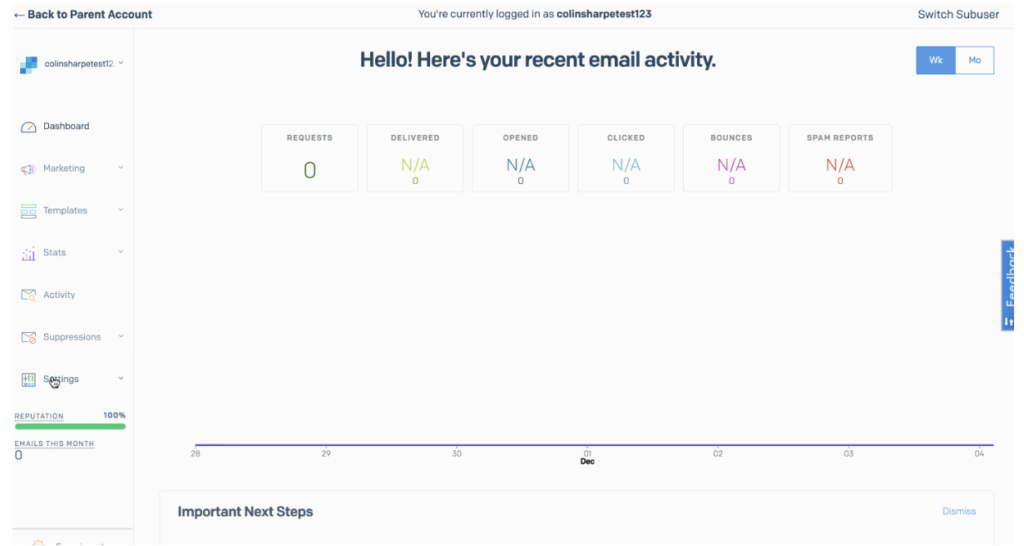
SendGrid Features
- Exceptional deliverability rate;
- Integration API for developers;
- Email tests;
- Spam testing;
- Email validation;
- Drag-and-drop editor.
Pros & Cons
| Pros | Cons |
| Scalability for large volumes | Complex for beginners |
| Strong deliverability rates | Limited email design tools |
| Detailed analytics | Can become expensive at higher volumes |
Pricing & Free Plans
| Plan | Cost | Limitations |
| Free | $0 | 6,000 emails/month, 2,000 subscribers |
| Basic | $15/month | 50,000 – 100,000 emails/month, 7,000 subscribers |
| Advanced | $60/month | 100,000 – 1.5 million emails/month, 15,000 subscribers |
SendGrid has a free plan for sending 6,000 emails/monthly to up to 2,000 subscribers.
11. Mailjet — Better Alternative for Transactional Emails
- Transactional email API;
- Great template library;
- Simple interface.
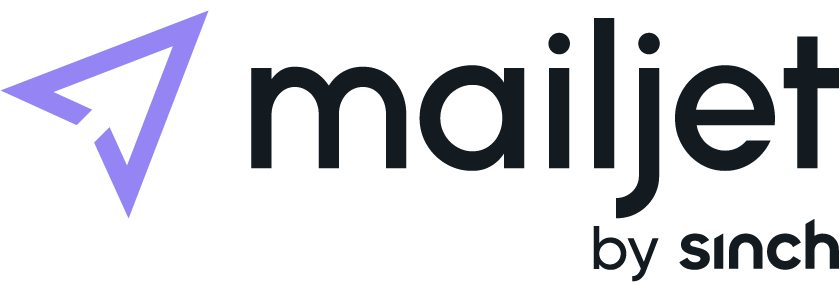
Ratings: Capterra: 4.3 | G2: 4.0 | Shopify: 1.0
Mailjet email marketing platform helps you design, send, and monitor email newsletters and automated email campaigns. It provides reliable transactional email functionality and good reporting capabilities.
You can create emails without coding with its email editor. It also natively integrates with ecommerce platforms like Drupal, making it an excellent alternative for ecommerce platforms. It also promises great data security and privacy features.

Mailjet Features
- Drag-and-drop editor;
- GDPR-compliant and ISO 27001 certified;
- Reporting dashboard;
- Supports over 80+ integrations.
Pros & Cons
| Pros | Cons |
| Affordable pricing | Limited integrations |
| User-friendly interface | Basic automation features |
| Reliable email deliverability | Less advanced reporting compared to competitors |
Pricing & Free Plan
| Plan | Cost | Limitations |
| Free | $0 per month | Unlimited contacts and up to 6,000 emails per month; |
| Essential | $17 per month | Unlimited contacts and up to 15,000 emails per month; |
| Premium | $27 per month | Unlimited contacts and up to 15,000 emails per month + marketing automation; |
MailerJet’s free plan includes the ability to send up to 6,000 emails per month, manage up to 1,500 contacts, and access features such as APIs, SMTP Relay, and Webhooks.
12. Constant Contact — Email Marketing Software like Mailchimp for Nonprofits
- In-built CRM dashboard;
- Social media integrations;
- Event management features.
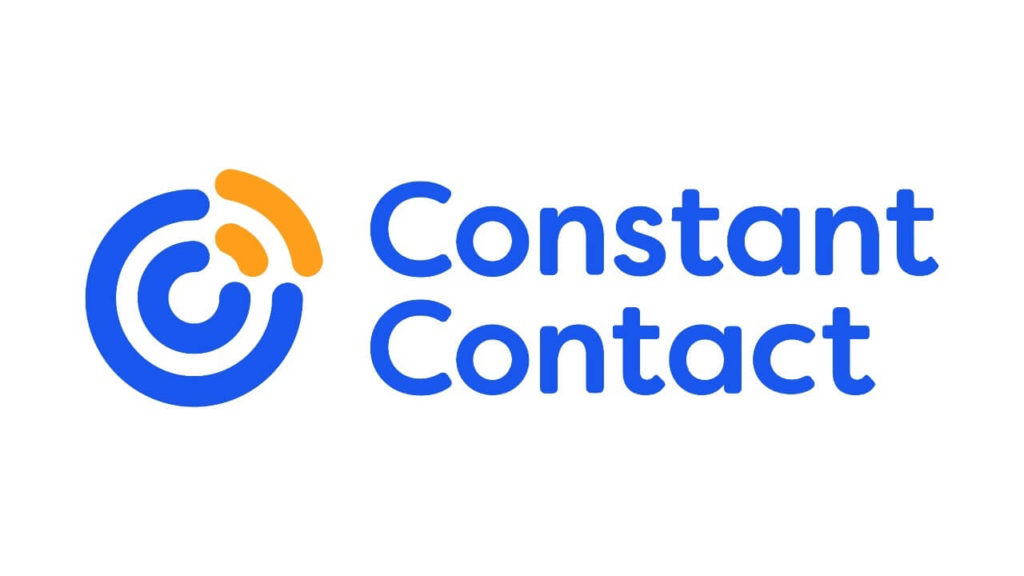
Ratings: Capterra: 4.3 | G2: 4.0 | Shopify: 3.0
Constant Contact offers email services like Mailchimp to automate email marketing and SMS campaigns. It’s designed for ecommerce store owners wanting to grow via omnichannel marketing.
Constant Contact automates lead generation and lead scoring through autoresponder workflows. You can also use Constant Contact to design landing pages and websites like Mailchimp.
But its restrictive starter paid plans don’t even support basic features like email scheduling, segmentation, and subject line personalization. This has made many users look for other alternatives.
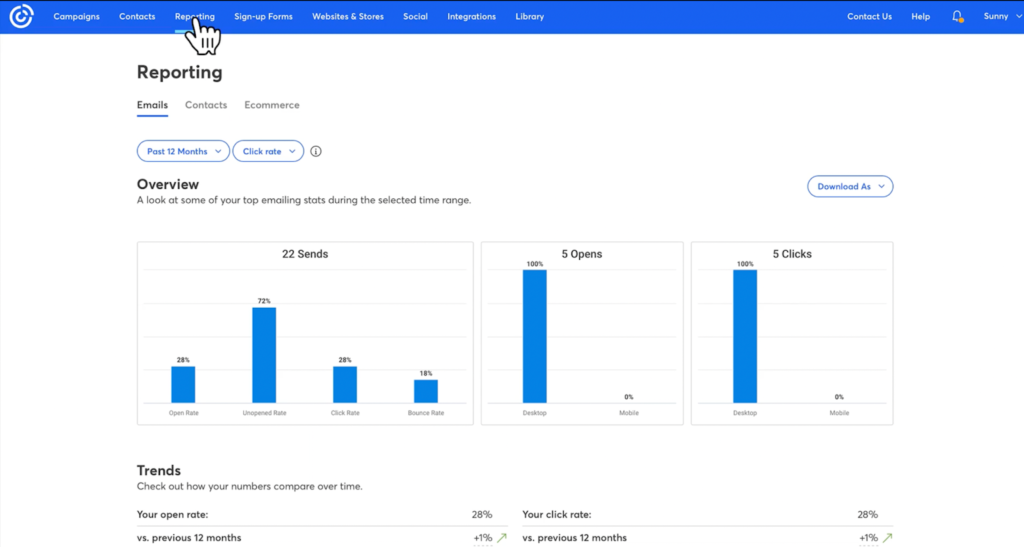
Constant Contact Features
- All-in-one digital marketing platform;
- Automation of email marketing and SMS campaigns;
- Website and landing page design capabilities;
- Social media activity management;
- Autoresponder workflows.
Pros & Cons
| Pros | Cons |
| User-friendly interface | Limited email automation capabilities |
| High email deliverability rates | Higher cost compared to some rivals |
| Comprehensive reporting and analytics | Limited customization options |
Pricing & Free Plans
| Plan | Cost | Limitations |
| Lite | $12 per month | Up to 500 contacts and 10x contact tier allowance; |
| Standard | $35 per month | Up to 500 contacts & 12x contact tier allowance |
| Premium | $80 per month | Up to 500 contacts and 24x contact tier allowance |
13. Flodesk — Email Builder and Beautiful Templates
- Brand guideline integration;
- Landing page builder;
- Easy automation setup.

Ratings: Capterra: 4.2 | G2: 4.0 | Shopify: NA
Flodesk is a powerful email marketing platform with a generous pricing model. For a flat monthly fee, it offers an email marketing solution with unlimited contacts, emails, forms, landing pages, etc.
You can build your landing pages, emails, and checkout pages with standard branding. There are in-built tools to nurture prospects and drive checkouts using an advanced yet easy-to-use automation builder.
Flodesk Features
- Intuitive design interface;
- A vast library of templates;
- Advanced segmentation;
- Workflow automation;
- Form builders;
- Brand consistency options.
Pros & Cons
| Pros | Cons |
| User-friendly interface | Limited advanced features |
| Unlimited subscribers and emails | Basic analytics |
| High-quality templates | Limited automation capabilities |
Pricing & Free Plan
| Plan | Cost | Limitations |
| $38/month | No email or subscribers limit | |
| Email + checkout | $64/month | No email or subscribers limit |
Flodesk doesn’t have a free plan or trial for users to try it out.
Also read: 15 Free Email Template Builders (HTML + Drag-and-Drop Editor)
14. Newsletter Plugin — Best Alternative for WordPress (WP) Users
- Automated newsletters;
- Native integration with WordPress;
- SMTP support.

Ratings: Capterra: NA | G2: NA | Shopify: NA
Newsletter Plugin is a dedicated plugin for WordPress websites for sending newsletters and email campaigns directly from the WP dashboard.
Compared to other MailChimp alternatives on this list, Newsletter Plugin only supports a WordPress website. The plugin helps you manage subscriptions, set up automation, build an email list, create a visual email, etc.
With over 3M+ downloads, Newsletter is the perfect option for a WordPress blog or WooCommerce website.
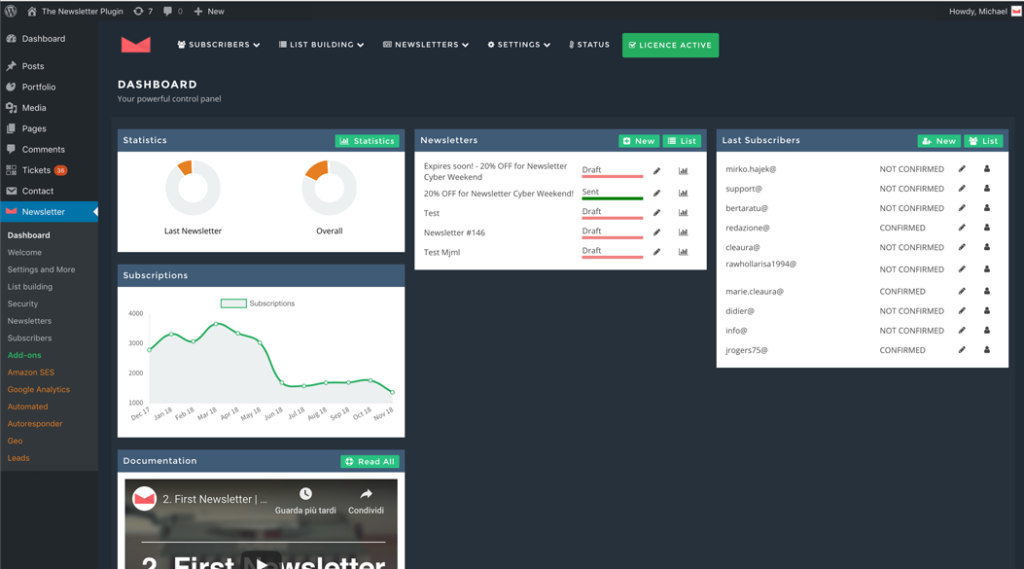
Newsletter Plugin Features
- Subscription form creation;
- List management;
- Automated newsletters;
- Statistics and reports;
- Customizable widgets;
- SMTP support;
- Extensions and add-ons.
Pros & Cons
| Pros | Cons |
| Easy integration with websites | Complexity for beginners |
| Advanced segmentation and personalization | Limited features in free versions |
| Automation and scheduling | Deliverability issues |
Pricing & Free Plan
| Plan | Cost | Limitations |
| Basic | Free | Basic features with no autoresponder, detailed analytics, etc. |
| Blogger | $69 per month | All features for 1 website; |
| Agency | $269 per month | All features for up to 3 websites. |
Newsletter Plugin has a free plan with very limited features.
15. Convertkit — Best Email Marketing Software for Creators
- Simple visual automation builder;
- Creator recommendation network;
- Free creator profile.
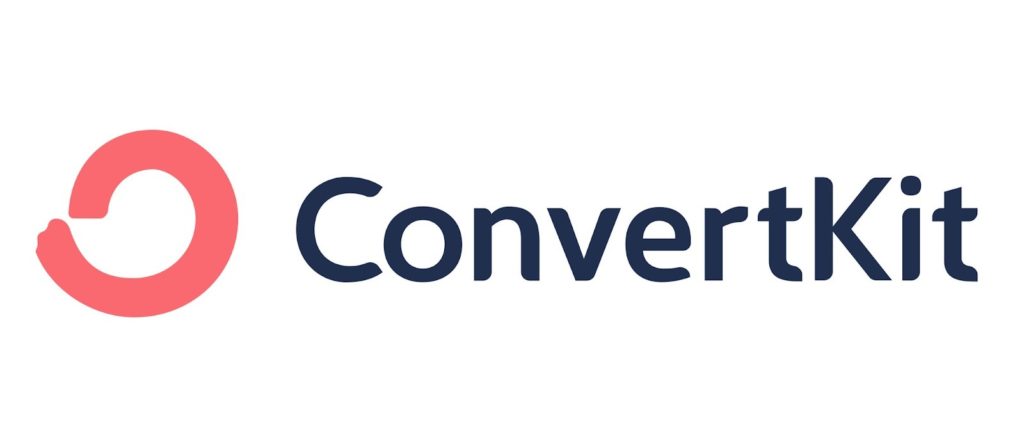
Ratings: Capterra: 4.7 | G2: 4.4 | Shopify: NA
ConvertKit is designed for creators and offers useful tools for building a community via email marketing. The tool makes it easy for non-geeky people to start using the platform for building and growing their email lists.
Use its landing page builder to start capturing leads on your website and nurturing them using automation sequences. All standard features, like as segmentation, form builder, and template library, are also available to manage your email marketing efforts.
ConvertKit Features
- Email automation;
- Customizable templates;
- Visual automation builder;
- Subscriber management;
- Landing page builder.
Pros & Cons
| Pros | Cons |
| Simple user interface | Expensive for large email lists |
| Advanced tagging and segmentation | Limited integrations |
| Responsive customer support | Basic email builder |
Pricing & Free Plan
| Plan | Cost | Limitations |
| Free | $0/month | Up to 1,000 subscribers, with no access to automation builder or sequences |
| Creator | $9/month | Up to 300 subscribers, with access to all features except advanced reporting and scoring, and referral features. |
| Creator Pro | $25/month | Up to 300 subscribers, with access to every feature on the platform |
ConvertKit’s free plan supports up to 1,000 subscribers and offers unlimited forms, broadcasts, and landing pages. Users also get an option to sell digital products and subscriptions on the free plan.
16. ActiveCampaign — Email Marketing Service with Advanced Analytics
- AI-based automation builder;
- Sales funnels and CRM;
- Social media ads integration.

Ratings: Capterra: 4.6 | G2: 4.5 | Shopify: 4.4
ActiveCampaign offers features like Mailchimp, known for its marketing and sales automation capabilities. If you run a Squarespace website, Shopify store, or B2B business with a long nurturing funnel, look at ActiveCampaign.
The platform helps you visualize your conversation funnel and check the probability of conversion, too. Other sales automation features include contact scoring and deal win probability. It also offers 500+ pre-built automation recipes for email marketing and CRM automation.
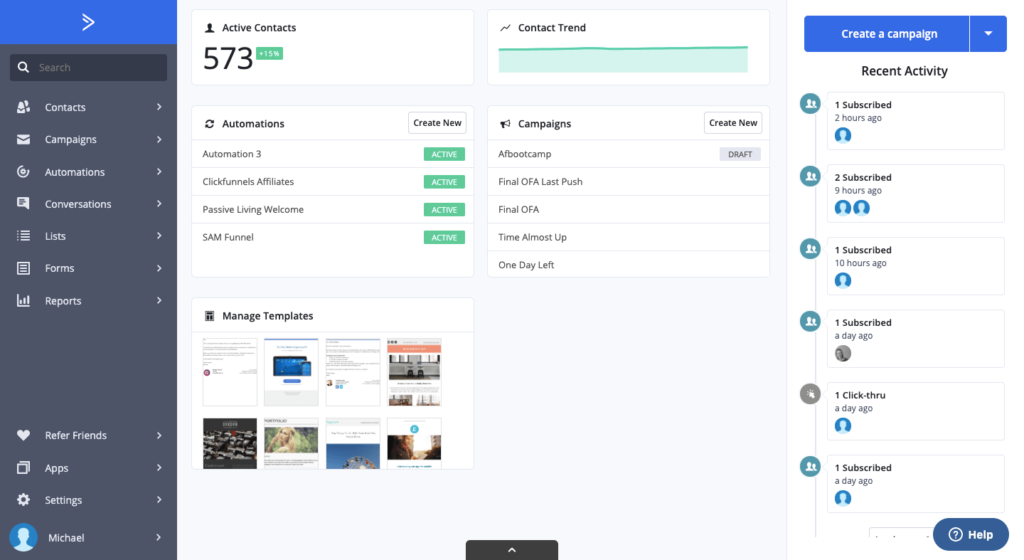
ActiveCampaign’s Features
- Advanced contact segmentation;
- Automation workflows;
- CRM with sales automation;
- Dynamic content;
- Event tracking;
- A/B testing.
Pros & Cons
| Pros | Cons |
| Advanced automation capabilities | Can be complex for beginners |
| Comprehensive CRM integration | Higher cost compared to some rivals |
| Strong segmentation and personalization options | Limited template designs |
Pricing & Free Plan
| Plan | Cost | Limitations |
| Lite | $15/month | Up to 1,000 subscribers |
| Plus | $49/month | Up to 1,000 subscribers |
| Professional | $149/month | Up to 2,500 subscribers |
| Enterprise | $259/month | Up to 2,500 subscribers |
ActiveCampaign doesn’t have a free plan but offers a 14-day free trial.
Historical Changes to Mailchimp Pricing Plans
Mailchimp hasn’t kept its prices consistent despite being a widely used email marketing service.
According to public sources, Mailchimp increases its prices between 7-14% year on year. Over and above the regular price increase, the platform also increase the prices of add-ons from time to time.
All this has led to an increase in email marketing costs for many small business owners around the globe. Here’s how their pricing plans changed over the last few years:
- June 2024. Premium plan reduced to 10,000 contacts, all other plans reduced to 500 contacts. Sending limit in all paid plans reduced from unlimited to 5,000-150,000 email sends per month;
- November 2023. Increased prices by 7% across all plans and tiers;
- March 2023. Reduction in free plan limits – 500 contacts and sending limit of up to 1,000 emails per month with a daily limit of up to 500 emails;
- February 2023. Increase in prices of the standard plan from $17/month to $20/month;
- August 2022. Free plan reduced to 500 contacts and 2,500 monthly emails, from 2,000 contacts and 10,000 emails previously;
- February 2022. Mailchimp increased its prices across all plans by 11%.
Mailchimp Insights
Before you decide, let’s compare everything and see what you’ll gain (or lose) when you go for an alternative to Mailchimp.
Pros & Cons
| Pros | Cons |
| User-friendly interface | Limited free plan |
| Comprehensive templates | Steep learning curve |
| Robust analytics | Higher cost at scale |
| Automation capabilities | Limited advanced features |
| Integrates with many apps | Occasional deliverability issues |
| Good customer support |
Pricing
As your subscriber list grows significantly, Mailchimp’s pricing can become relatively more expensive compared to other email automation platforms.
Additionally, some advanced features may require a higher-tier plan, which could be a consideration for businesses with specific requirements. Take a look:
| Plan | Subscribers limit | Emails per month | Price per month | Features included |
| Free | Up to 500 | 1,000 | $0 | Basic email features, limited support |
| Essentials | Up to 500 | 5,000 | Starts at $13 | All free features, live chat support, advanced features |
| Standard | Up to 500 | 6,000 | Starts at $20 | All growing business features, advanced automation, dedicated support |
| Premium | Up to 10,000 | 150,000 | Starts at $350 | All advanced features, custom reporting, dedicated account manager |
Mailchimp’s Free Plan
Mailchimp’s free plan offers basic email marketing tools. It allows up to 500 contacts and 1,000 monthly emails.
However, the free tier lacks advanced capabilities. The plan only offers limited reporting features. There’s no automated customer journey or A/B testing. There’s an email-only support for 30 days. Dynamic content and behavioral targeting are unavailable, and the plan only supports a single audience.
Mailchimp Alternatives FAQs
Now that we’ve looked at the best email marketing services equivalent to Mailchimp, let’s review some of the most frequently asked questions:
What is the best free Mailchimp alternative?
If you’re sick of Mailchimp’s steep pricing and have been looking for a free alternative, you should try Sender. With Sender, you can access unlimited automations, popups, and 15,000 monthly emails for free, along with live chat support. Even as you scale, the cost to run email campaigns is not as high as Mailchimp.
What are the best alternatives to Mailchimp?
There are many alternatives to MailChimp. You should pick one depending on the features you need and your budget. If you’re seeking an alternative that’s high on features but low on costs, you should definitely try giving Sender a shot. It has everything you need without the high price point.
Who is Mailchimp’s biggest competitor?
Mailchimp has many competitors like Sender, Convertkit, GetResponse, Drip, etc. We’ve covered all major ones in this blog. You can quickly look at the sections above to understand what’s the best alternative to Mailchimp.
Is Mailchimp the best email marketing tool?
No. Mailchimp isn’t the best marketing tool. In fact, there’s no such thing as the best email marketing tool. Everything depends on your requirements, budget, and your email marketing goals. While picking one, you should always try using a free plan and decide if the tool is best for you.
What features are important in a Mailchimp alternative?
When searching for an alternative to Mailchimp, look for automation, template library, and integration, along with the following features:
- Intuitive drag-and-drop editor. This feature simplifies customizing emails and ensures they look visually appealing. Look for a solution that doesn’t require coding or design expertise;
- Template library. Pre-designed templates save you time and effort by offering a starting point for your email designs;
- Email automation: Automation tools, including autoresponders and automated email sequences triggered by user behavior or specific events;
- Advanced segmentation. Helps in delivering relevant and personalized content by dividing email lists into targeted groups based on interests or past behavior;
- Analytics and reporting: Reporting features for monitoring the performance of your email campaigns and optimizing marketing strategies.
